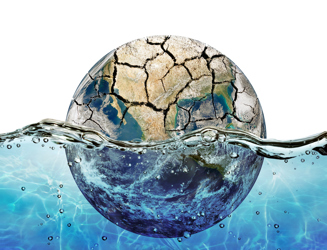Extreme Swings In Water Levels 'Wreaking Havoc' On Chicago Water System


The prevalence of drought in the western United States, spurred in large part by climate change, is the most existential drinking water challenge of our age. But in the Midwestern mecca of Chicago, climate change is not just drying source water supplies up — swings from dry conditions to exceedingly wet ones are creating unique challenges for utilities.
“Heavier rainfall and more frequent droughts are now causing extreme swings in the water levels at Lake Michigan and the Chicago River, wreaking havoc on the city and prompting urgent action to find a fix,” CNBC reported. “Chicago’s Metropolitan Planning Council has been pushing the city to reduce its carbon footprint, because the only real fix locally is to limit warming globally.”
Last winter, Lake Michigan’s water level hit a record high, flooding downtown areas of Chicago and overwhelming the city’s backup stormwater management system.
“Downtown Chicago suffered massive flooding, even knocking out power at the Willis Tower, formerly known as the Sears Tower,” per CNBC. “Experts say this was not a once-in-a-lifetime event, but a sign of what is to come, as climate change causes heavier rains and more intense storms.”
But, surprisingly, prolonged drought caused the Lake Michigan water level to hit a record low just seven years before that, threatening the city’s ability to provide drinking water. Such startling swings in the availability of source water make it difficult for one of America’s largest cities to manage the world’s most critical resource.
And as Chicago becomes an epicenter for the damaging impacts of climate change, environmental workers in the region are appealing for significant federal action. They are making it clear that source water availability and flooding are not the only water or wastewater issues that the city faces.
“The union local in Chicago representing Environmental Protection Agency employees across the Midwest is asking President Joe Biden to declare a climate emergency and take major unprecedented actions to slow global warming,” the Chicago Sun-Times reported. “Extreme weather has led to disappearing beaches and eroding shoreline along Lake Michigan. Warming weather can lead to more algae in Lake Michigan, which may harm fish and water quality. Severe storms may lead to more pollution runoff and sewer overflow into the lake, a source of drinking water for millions in Chicago and the surrounding area.”
To read more about how water systems attempt to control increased rainfall, visit Water Online’s Stormwater Management Solutions Center.
